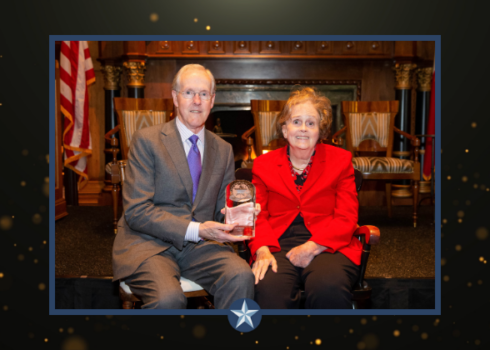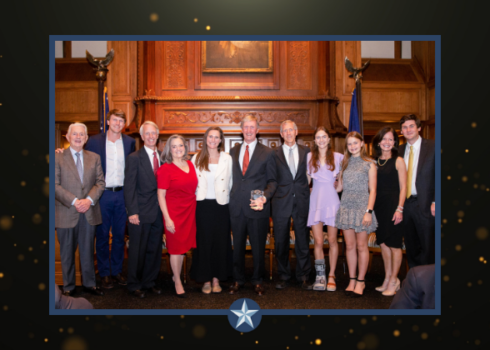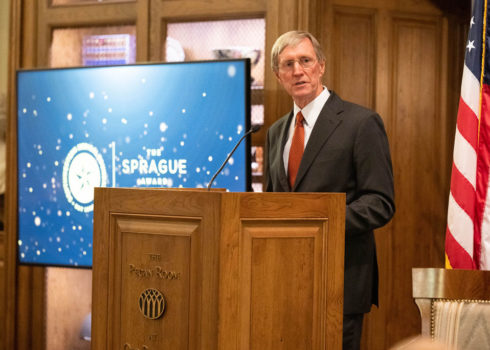Effecting positive and transformative change in the world brings great joy to Nancy and Jeremy Halbreich. They love Dallas and its people, and their causes are many and range from health care and medical research, to culture and arts, education, and helping the disadvantaged. Described by their peers as two remarkable human beings and life partners who bring out the best in each other, the Halbreichs look to the future through hopeful eyes. They have been married for 37 years and appreciate love of family, abundant friendships, good health, and the vibrancy of the city they call home.
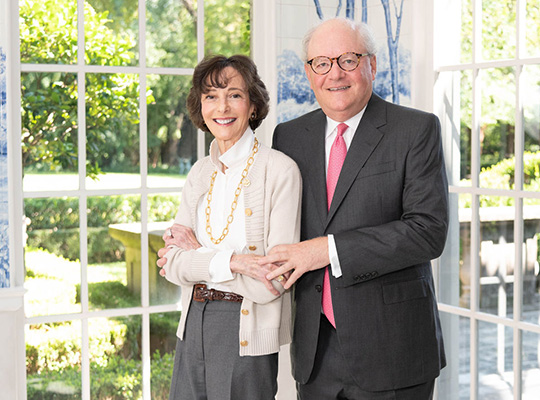
Meet Nancy and Jeremy Halbreich
The Halbreichs have been longtime friends of Southwestern Medical Foundation in their mission to inspire and advance progress in medicine. Since 2002, Mrs. Halbreich has served as a Trustee of the Foundation and has been a member of the Public Affairs Committee since 2011. She was a member of the UT Southwestern President’s Advisory Board from 2017-2020 and served on the Campaign for the Brain Steering Committee from 2019-2022, to advance brain research and clinical care at the Peter O’Donnell Jr. Brain Institute. The Brain Campaign was one of the largest brain-focused investments at a U.S. academic medical center. Mr. Halbreich serves on the President’s Advisory Board at UT Southwestern, as well as on its Government Affairs Committee. In 2014, the Halbreichs endowed two professorships at UT Southwestern. Earlier, they helped establish the Annette G. Strauss Center for Neuro-Oncology where they endowed a professorship in honor of Nancy’s father, Ted Strauss. They are passionate about and have given generously to many causes at UT Southwestern, including brain disease, gastroenterology, and cancer prevention and treatment.
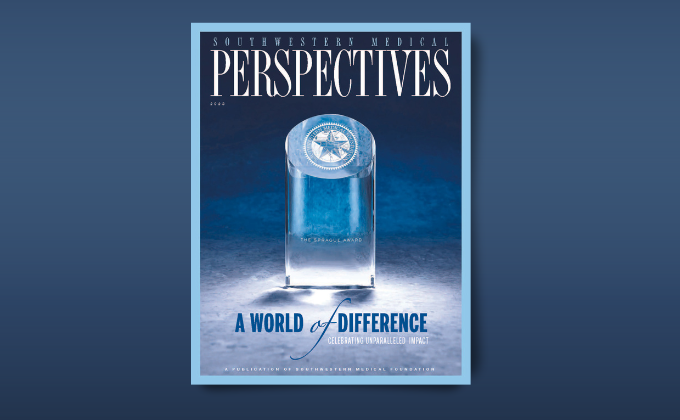
A World of Difference – Celebrating Unparalleled Impact
Read the 2023 edition of Southwestern Medical Perspectives featuring all three of the 2022 Sprague Award honorees and their incredible impact on medical progress. Also in this issue, we celebrate 50 years of collaboration at UT Southwestern with two Nobel Laureates, Michael S. Brown, M.D., and Joseph L. Goldstein, M.D.
Read MoreIn 2019, the Halbreichs joined The Heritage Society with a legacy gift to invest in further discovery and treatment of glioblastoma, an aggressive type of brain cancer. Finding a cure for glioblastoma is important to Mrs. Halbreich after witnessing the tremendous toll the disease took on her mother, Annette Strauss, and everyone who surrounded her throughout her cancer journey. The Honorable Mrs. Strauss was a philanthropist and politician who spent many years in service to this community, including two 2-year terms as mayor of Dallas. She passed away in 1998.
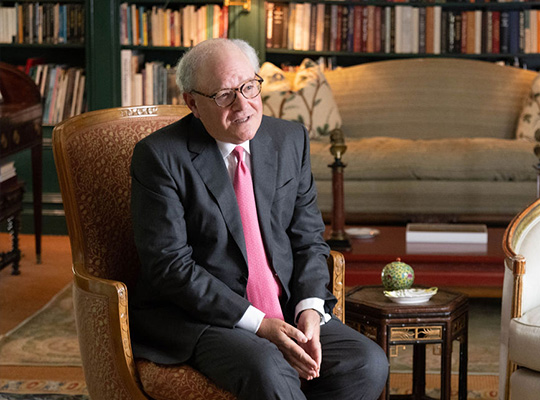
Mr. Halbreich was born in Cleveland, Ohio, to parents who were both survivors of the Holocaust. They met immediately after the end of WWII in a displaced persons camp, fell in love, and got married. They later moved to Cleveland, where Mr. Halbreich’s father had relatives who helped the young couple get started. When Mr. Halbreich was seven, the family moved to Los Angeles and settled in south Beverly Hills so that he and his sister could attend the best quality schools.
After graduating at the top of his class at Beverly Hills High School, Mr. Halbreich earned a B.S. in Economics in 1974 at Harvard University, where he served as Business Manager of the college newspaper, The Harvard Crimson, from 1973-74. He completed the Harvard Business School Advanced Management Program in 1985. He is the Founder, Chairman, and CEO of AIM Media Management LLC. He was Chairman and CEO of Sun-Times Media LLC; Founder, Chairman, President and CEO of American Consolidated Media, Dallas; and President and General Manager of The Dallas Morning News, where he began his career and spent 24 years. He has served and continues to serve in leadership positions on numerous national and local business and philanthropic boards.
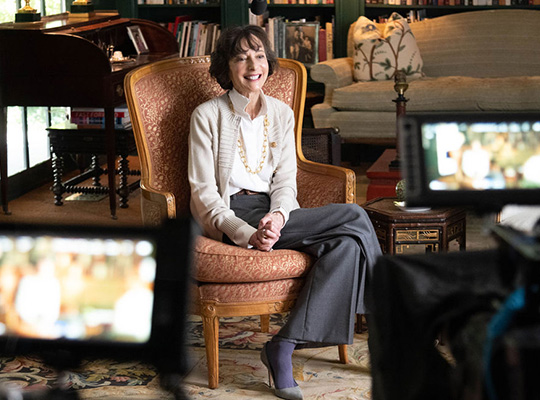
A native Dallasite, Mrs. Halbreich received her B.A. in Art History from The University of Texas at Austin, and pursued her Masters in Liberal Arts, with art history as her concentration, at Southern Methodist University. She enjoyed a successful career in fashion retail, working for Neiman-Marcus, The Village Garden, SL Art Gallery, Stanley Korshak, Sotheby’s, and Heritage Auctions. She has worked tirelessly to make Dallas a better place, devoting herself to many causes, sitting on the boards of various organizations, and winning numerous awards for her philanthropic and community work.
Together, Nancy and Jeremy are changing the world in profound ways. Here they share their thoughts about why they are passionate about caring for the community.
Nancy and Jeremy Halbreich Q&A
Q: You have both demonstrated outstanding civic involvement and have done so much for the community, and for UT Southwestern in particular. What influenced your philosophy of giving back to the community?
Mr. Halbreich: For Nancy and me, giving is just pure instinct. We are lucky because we share so many interests, including a commitment to helping others who aren’t as fortunate as we are. As the only son of Holocaust survivors, I know up close the horrific consequences of man’s inhumanity to man. The past has to teach us about the future.
Mrs. Halbreich: My parents treated me like I was the center of the universe, but they taught me very early that I was not, and that the world was composed mainly of other people, most of whom were not as lucky as I was. From a young age, I was always very mindful that we are all here to help each other. My parents demonstrated how rewarding it could feel to make someone’s life a little easier.
Q: Nancy, you have had amazing role models in your life, and now you are a role model to so many in North Texas. What is the most important thing they taught you?
Mrs. Halbreich: They all demonstrated kindness. My parents, and especially my mother, taught me how to think about others by putting myself in their shoes and doing something to lighten their load. My dear friend Ruth Altshuler was so “other-oriented,” and she did a good deed every day. Everyone has the power to be kind. People will never remember what you say, they’ll never remember what you do, but they will always remember how you made them feel.
Q: Jeremy, you’ve been referred to as “one of the giants of the news industry – both personally and professionally.” Describe your passion for journalism and how it developed.
Mr. Halbreich: In college, I became steeped in the importance of journalism while working at The Harvard Crimson. The Crimson is not your average college newspaper because it is completely independent of the university, so it is a special experience for students to learn how to run a newspaper business without any oversight other than from their peers. Today the newspaper is still printed on the presses I installed when I was a senior. I came to Dallas, where I had a successful run at The Dallas Morning News. I left to start my own newspaper company, which is where I am today.
Local journalists must be thought leaders and are the glue that holds communities together. For me, every newspaper location is unique and reflects its own community. If something bad happens in the community that needs to be reported, we must report it, but in a way that is proactive and positive. It takes a real commitment to come up with creative ways to support local journalism that will make communities better places for people to live.
Q: What do you see in the future of UT Southwestern Medical Center?
Mr. Halbreich: For decades, UT Southwestern has been a distinguished institution that was well known nationally and internationally for its medical school and its vast diverse research efforts. Over the last 10-15 years, the clinical care side of the institution has grown and flourished. The leadership at UT Southwestern has always aspired for it to become one of the top medical institutions in the country. We are in the top 25, and the institution continues to grow, not just in quantity but in quality ways. We are so excited about what the institution is doing today across a variety of medical disciplines – cancer, brain research, gastroenterology, cardiology – areas where Nancy and I or members of our family have been involved firsthand. It is impossible for us to come away from any of those experiences and not feel a great debt of gratitude and commitment to the institution.
Mrs. Halbreich: I am so proud of what UTSW has become as an institution. We are on the threshold of so much. I think there are going to be breakthroughs in so many areas at UTSW that are going to change the course of medicine forever. We have attracted great researchers, and our laboratories are exciting places. Our clinical care is without peer anywhere in this city, which always makes me happy to help others enter the UTSW system.
Q: What advice would you give to a young person who wanted, as you have, to make his or her community a better place?
Mrs. Halbreich: I would tell them not to be afraid of meeting new people and exploring new ideas. Young people are bright and articulate, they are interested in one another, and they care about things bigger than themselves. Their small part can make a huge difference in the future of Dallas, and they are my hope for the next generation and the generation after that.
Mr. Halbreich: The spirit of the people of Dallas is unique. If you are willing to roll up your sleeves and work on bettering the community, you are welcomed with open arms. If someone has an interest, if not a passion, it is very easy to contact an organization or one of the umbrella organizations to sign up and get started.
Q: What are your hopes and dreams for our region?
Mr. Halbreich: When I first came to Dallas to work at The Dallas Morning News, I was interested in a career in newspaper publishing. I sensed great opportunities for growth and development in this region, and that is exactly what has occurred and continues to occur. The growth north of Dallas, the development south of downtown, and everything west towards Fort Worth covers a lot of geography and equates to ample opportunities. Dallas will continue to thrive, and I think it’s incumbent on people who live here irrespective of their stage in life to make the community a better place today for people and families, and certainly for people who will follow.
Mrs. Halbreich: I have lived in Dallas for more than 70 years, and I have witnessed a rejuvenation of the city. My mother built bridges between disparate parts of society, and she taught me to always believe in hope and making life better for others. The people here have a real ‘can-do,’ optimistic outlook on life. I love the inclusiveness of the city, which is very welcoming to newcomers.
Q: What does it mean to you to be honored with The Sprague Award?
Mr. Halbreich: It means a lot, and we are very humbled. Nancy and I both knew Charlie Sprague, and we know what a pillar he was in helping establish and develop UT Southwestern into the institution it is today. Many of our doctors are not just our confidants or people that we consult with on health matters, they have become our best friends. It all adds up to a wonderful feeling and a deep sense of appreciation.
Mrs. Halbreich: Jeremy and I are so honored to be receiving this award, not only because the extraordinary people who have received it in the past, but also because it bears Charlie Sprague’s name. Not only was Dr. Sprague an amazing skilled technician, but he also treated all his patients not just as patients, but as good friends. He had the emotional quotient in spades, and he left such a legacy. My affiliation with UT Southwestern and Parkland has resulted in, by far, the most meaningful relationships I have had in my life, other than my family and friends.
Q: You joined The Wildenthal Society (formerly The Heritage Society) in 2019 with a gift to further the discovery and treatment of glioblastoma. What does this gift mean to you?
Mrs. Halbreich: My mother died shortly after her glioblastoma diagnosis. We wanted her death not to have been in vain, and we hoped that something good could come out of it so that someone else might not have to suffer as she did, as well as our family. We hope glioblastoma can one day become a manageable chronic disease with more effective treatments so people can live their best lives. There is nothing in this world – nothing – more important than your health. Our commitment to UTSW has built over time, and we remain steadfast in our support for the institution today and in the future. We want to try to leave this world a little better than the one we found, and we believe our investment will make a difference for the next generations.
